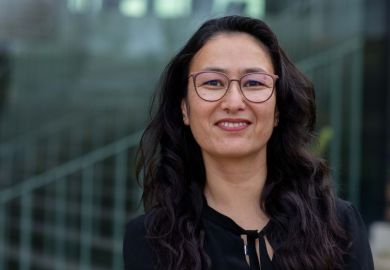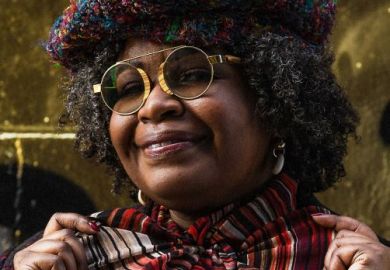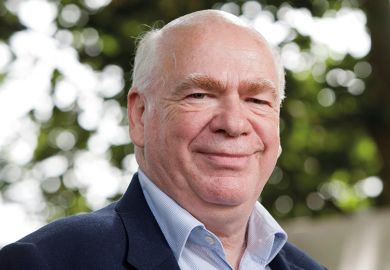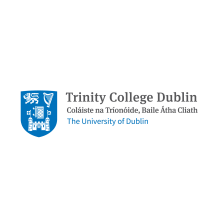Katriona O’Sullivan is senior lecturer in digital skills at Maynooth University. She had a rocky path into academia, overcoming a disrupted and difficult early life that saw her pregnant and homeless at the age of 15. After joining Trinity College Dublin through its access programme, she took a bachelor’s in psychology, staying on for a PhD in the same subject. Her autobiography Poor is due to be published by Penguin in May 2023.
Where and when were you born and how has this shaped who you are?
I was born to an Irish family who were living in Coventry. Where I lived it was really multicultural: Pakistani, Indian, Jamaican, Scottish, Irish. I suppose that shaped me in a way because I didn’t see that much difference in people. Growing up in poverty shaped me in always feeling like I didn’t have enough, and feeling really hungry all the time.
You’ve spoken about your parents’ heroin addiction and how your dad spent a lot of time in prison when you were younger. What were your favourite books back then?
I actually had a children’s bible that I used to read a lot. I’m not religious but I loved the stories. We didn’t have a lot of books in our house, so I was reading my dad's James Herbert books or whatever was available.
You were homeless and pregnant at the age of 15. What would you say to that teenager if you could speak to her now?
I felt completely lost and hopeless, so I would probably tell her to hold on, that it’s going to get better, and you’re not going to believe what’s going to happen to you.
Where did your interest in psychology come from?
I’ve always been very suspicious and kind of critical in my thinking. I was also really interested in why people behave the way they do and trying to understand why my parents were addicts, or why some people are violent. I could’ve easily gone for law or philosophy because I loved them as much, but I took psychology because it had the least hours, and I was a lone parent and I needed to be at home more.
What sticks out to you most when you think back to those first weeks and months on the access programme at Trinity?
How scary it was. I didn’t know anyone who went to university, especially not a university like Trinity. You really become aware of privilege when you’re in a place like Trinity College. But the other thing was it was so supportive. Every grade, every comment, every positive achievement was like fighting against the other part of me that really believed I wasn’t good enough. That was so powerful, to feel those feelings of, “I can do this, I’m really good at this.” That’s never gone away from me.
What divided your life into a ‘before’ and ‘after’?
There’s definitely a before and after I left Trinity. Before I was working in an institution that in some ways was perpetuating inequality by the way it works. When I left Trinity and became an academic in my own right, I was able to actually implement what I believe to be the way that we widen participation.
You say Trinity’s access programme perpetuates inequality, but you were a beneficiary of it. Can you explain that a bit more?
It’s a human right to be allowed to do whatever it is you dream to do. The idea of charity just bothers me. I brought so much to Trinity. Me, this working-class girl, added to the vibrancy and the knowledge base of that institution through my research and my background. Sometimes that is forgotten in the language we use. The access programme is at the back of Trinity, off-campus. You shouldn’t be making people go to the back of college and hide away for a year if you really are about inclusion and access and equality.
You’ve spoken about being surrounded by middle-class peers. Did social class become less important as an academic?
No. The language I use, the way I dress, the things I watch on the TV: they’re all different from most middle-class academics. But it’s also really important for me to try to remain true to who I am and where I come from. It can be really hard; I’ve been in staff meetings and had people talk about people from poverty in really disparaging ways and that can be really hurtful.
Do you think it’s any easier for someone with your early life experiences to feel at home at a university these days?
Some universities are really good at inclusion and have a lot of diverse students. But I don’t think it’s changed a lot. It’s going to be hard for someone like me as an adult to fit into a university situation, irrespective of what the university is doing, but I don’t think we’re doing enough to make university accessible for people like me.
What about the survival skills you learned growing up – do they ever come in handy as an academic?
I know how to read a room. When you grow up with addict parents, you’re on all the time: you’re looking to see what’s happening, who’s going to throw a plate across the room. The other thing that I have which is really important is balls. As a lone parent on social welfare, you’re questioned a lot. You have to learn to advocate for yourself a lot.
If you weren’t an academic, what do you think you’d be doing?
I’d probably be cleaning toilets somewhere or serving someone in a cafe.
How do you want to be remembered?
I’d like to be remembered for making the education system fairer and never giving up. And for being a great mum to my boys.
ben.upton@timeshighereducation.com
CV
2003-07 bachelor’s (honours) psychology, Trinity College Dublin
2008-12 PhD psychology, TCD
2009-17 psychology tutor, Trinity Access Programmes
2010-17 course coordinator, School of Psychology, TCD
2012-13 lecturer, Dublin Business School
2012-17 adjunct psychology lecturer, TCD
2017-present lecturer, and now senior lecturer, in digital skills, coordinator of Think about Teaching foundation year, department of education, Maynooth University
Appointments
Amy Parsons is returning to Colorado State University as president. She will take on the leadership of the flagship Fort Collins campus in February, having previously spent five years as executive vice-chancellor of the wider CSU System from 2015, and six before that as vice-president for university operations at Fort Collins. Since 2020 she has been chief executive of e-commerce company Mozzafiato. Kim Jordan, chair of CSU’s board of governors, said Ms Parsons had a “deep appreciation and respect for the university” as well as the business expertise “needed to manage the complexity of an organisation this size”.
James Knowles has been appointed vice-chancellor of Solent University and will take up the post in April. Currently senior vice-principal for education at Royal Holloway, University of London, he will succeed Karen Stanton at the Southampton institution on her retirement. Previously Professor Knowles was professor of renaissance literature and culture and vice-dean (research) at Brunel University London. He said he was “delighted to be joining this modern, vibrant and inclusive university at such an exciting time”.
Ken McPhail will be the next head of Alliance Manchester Business School, in a promotion from his current post as professor of accounting. He will succeed Fiona Devine in August, when she becomes vice-president and dean of humanities at the University of Manchester.
James Wilsdon is joining UCL as professor of research policy. He is currently Digital Science professor of research policy at the University of Sheffield.
Ashley Bloomfield, formerly New Zealand’s director general of health, is joining the University of Auckland as professor in the School of Population Health.
Rachel Dickson has been appointed deputy director, academic, at Glasgow School of Art. She is presently dean of academic programmes at Central Saint Martins, part of the University of the Arts London.
David Go has been named vice-president and associate provost for strategic planning at the University of Notre Dame.
Register to continue
Why register?
- Registration is free and only takes a moment
- Once registered, you can read 3 articles a month
- Sign up for our newsletter
Subscribe
Or subscribe for unlimited access to:
- Unlimited access to news, views, insights & reviews
- Digital editions
- Digital access to THE’s university and college rankings analysis
Already registered or a current subscriber?






